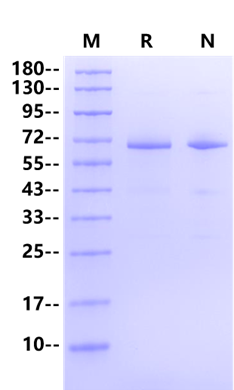Trp27-Ser549, with C-terminal 10*His WELTILHTNDVHSRLEQTSEDSSKCVNASRCMGGVARLFTKVQQIRRAEPNVLLLDAGDQYQGTIWFTVYKGAEVAHFMNALRYDAMALGNHEFDNGVEGLIEPLLKEAKFPILSANIKAKGPLASQISGLYLPYKVLPVGDEVVGIVGYTSKETPFLSNPGTNLVFEDEITALQPEVDKLKTLNVNKIIALGHSGFEMDKLIAQKVRGVDVVVGGHSNTFLYTGNPPSKEVPAGKYPFIVTSDDGRKVPVVQAYAFGKYLGYLKIEFDERGNVISSHGNPILLNSSIPEDPSIKADINKWRIKLDNYSTQELGKTIVYLDGSSQSCRFRECNMGNLICDAMINNNLRHTDEMFWNHVSMCILNGGGIRSPIDERNNGTITWENLAAVLPFGGTFDLVQLKGSTLKKAFEHSVHRYGQSTGEFLQVGGIHVVYDLSRKPGDRVVKLDVLCTKCRVPSYDPLKMDEVYKVILPNFLANGGDGFQMIKDELLRHDSGDQDINVVSTYISKMKVIYPAVEGRIKFSGGGSGGGSHHHHHHHHHH
>90% by SDS-PAGE
CD73, also known as ecto‐5′‐nucleotidase (NT5E), is a glycosylphosphatidylinositol (GPI)‐anchored protein encoded by the gene NT5E, reacts on the surface of immune cells, stromal cells and cancer cells. It is a part of the extracellular enzymatic mechanism that regulates the conversion of extracellular ATP to adenosine. CD73 undergoes N-linked glycosylation, disulfide bond-mediated homodimerization, and membrane association via a glycosylphosphatidylinositol (GPI) anchor. CD73 is involved in ATP metabolism, which cooperates with CD39 to generate anti‐inflammatory adenosine from pro‐inflammatory ATP. CD73 regulates tissue homeostasis and pathophysiological responses related to immunity, inflammation, and cancer.


Immobilized CD73 His Tag, Human (Cat. No. UA010067) at 2.0μg/mL (100μL/well) can bind Anti-Human CD73 Monoclonal Antibody (Oleclumab) with EC50 of 1.12-1.26ng/mL.